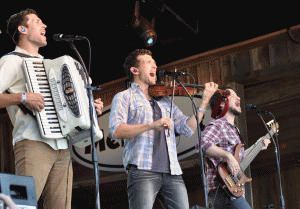By Warren Cole Smith
(WNS)–The summer music season has seen hundreds of thousands of people gather at festivals like Bonnaroo in Tennessee or Coachella near Los Angeles. The season kicks off with MerleFest, the annual bluegrass and Americana festival that attracted more than 76,000 people back in March to the Appalachian foothills in North Carolina.
I first met Danylo Fedoryka, one of the founders of the band Scythian, when I noticed the pro-life stickers on his guitar case at MerleFest. The band debuted its new album Jump at the Sun at MerleFest but just released it to the public this month. I sat down at MerleFest with Fedoryka to discuss the band’s music and philosophy of performing.
This is the 10th anniversary year of Scythian. Say a little about your evolution. We started out as street performers and then we became a pub band. We had a very strong conviction that we wanted … an apprenticeship. … We wanted to put in a lot of years playing the traditionals, the standards, so we could basically learn before we started writing our own originals.
You did this in the Washington, D.C., area, right? We started out in D.C., and then it wasn’t long before we made it up to Baltimore and Philadelphia and New York City. We just ran that circuit for about four years, and we did maybe about 500 shows before we got booked for our first festival. We just gave ourselves permission not to write music because we didn’t want to put something out that seemed forced. We were convinced that when it was time for it to come out, it would come out.
The first four years that you were playing, you were not writing any original stuff? We didn’t. We just felt no pressure because there was such a love of discovering this new tradition. I’m Ukrainian. I’m not even Irish. When we discovered [the Irish] tradition, we were like, “Who are these people that make this joyful music?” We just would listen. … We knew how to perform, and we had a sense of what was good musically. You have to be yourself with a tradition before you can start reflecting the tradition.
After four years you started writing some of your own music. Who is the primary songwriter for the band? I would say it’s my brother. I did the first ones because I’m a little bit more talky. I just wrote … some happy-go-lucky tunes. My brother—I think he’s introverted, but I think he does have a great knack for writing. He’s written probably about 75 percent of our tunes. They’re various topics, from just a hoedown dance, to a song dedicated to my grandparents. They escaped the communists and the Nazis during World War II. [He wrote about] what it may have been like for them to just pack up and leave and never to return. That was called A Song of Sacrifice.
We have somber tunes. We have happy tunes. We don’t put restrictions on ourselves about how the tune is going to sound. For that reason, a lot of people say, “It’s hard to put you into a genre because you have so many different sounding tunes.” We really do believe in this point, that the Holy Spirit is inspiring us.
You’ve alluded to faith in addition to family being an important part of who you are. You don’t bill yourselves as a Christian band or religious band at all. That’s true, and I think a lot of that comes from my mother’s influence. She went to The Juilliard School, and she was in the world, but not of it. She had the very strong conviction of the purpose of music, and she told us from the time we were very little every performance should start beforehand with a prayer. We offered it up for God’s greater glory, so it didn’t make a difference if you messed up or not. If your intention was to bring it to other people for God’s glory, then you had a successful show.
She said, “Music is for everybody.” If you’re called to do Christian music, then do it. But if you’re not, don’t feel guilty about not doing it. As long as you do it for His glory, and you try to represent the true, the good, and the beautiful, it’s going to touch people’s hearts. That’s how God moves in people’s lives, having their hearts touched through love and through beauty. If people are curious, then they can come and talk to you about your faith. She said, “That’s your only job: just reflect God’s love and beauty.” My mom taught us that early on, and I think it’s been awesome for us to always think about that throughout these years, because it’s the true purpose of music. When we get on stage, it’s an act of service.
At the same time you’re not bashful about your beliefs. I first met you because you had this big, fat pro-life sticker on your guitar case. There’s always a little bit of tension because you don’t want to be too political in people’s faces, but the pro-life movement is one of those things I’m just so deeply committed to. Being the eighth of 10 children, I know I’m here because my mother was pro-life. My grandfather was a freedom fighter. He was in Auschwitz, but he survived. I’m very aware how it’s affected my life, and someone needs to speak up for the people who can’t speak up. I just put the sticker on there. I know it ruffles some feathers, but I know if I’m just myself, and they get mad about that sticker, that they’ll talk to me eventually. And I know I can have a civil conversation.








